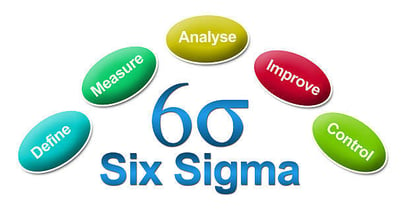Production Quality Control: The Role of Six Sigma Methodologies
Operations Directors are tasked with the responsibility of orchestrating complex production processes while maintaining efficiency, compliance, and ultimately, the integrity of the products. In this quest for excellence, Six Sigma methodologies emerge as indispensable tools for achieving consistent quality and minimizing defects.
In this blog, we'll look into the significance of Six Sigma in production quality control within pharmaceutical manufacturing, and explore its integration with advanced planning and enterprise resource planning (ERP) systems like PlanetTogether, SAP, Oracle, Microsoft, Kinaxis, Aveva, and others.

Six Sigma Methodologies
Six Sigma is a data-driven approach to process improvement, aiming to minimize defects and variations in production processes. Originating from Motorola in the 1980s and popularized by companies like General Electric, it has become a cornerstone of quality management across industries. At its core, Six Sigma relies on statistical analysis and rigorous problem-solving methodologies to identify and eliminate root causes of defects, thereby enhancing product quality and customer satisfaction.
The DMAIC (Define, Measure, Analyze, Improve, Control) framework is the backbone of Six Sigma implementation:
- Define: Clearly define the problem, project goals, and customer requirements.
- Measure: Quantify the current process performance and gather relevant data.
- Analyze: Identify root causes of defects and inefficiencies using statistical tools.
- Improve: Implement solutions to address identified issues and optimize processes.
- Control: Establish controls to sustain improvements and monitor performance over time.

Integrating Six Sigma with Pharmaceutical Manufacturing
In pharmaceutical manufacturing, where precision and consistency are critical, integrating Six Sigma methodologies into quality control processes is imperative. Operations Directors must leverage data-driven insights to enhance manufacturing processes, minimize batch variations, and ensure compliance with regulatory standards such as Good Manufacturing Practices (GMP).
Process Optimization
Utilizing Six Sigma tools such as process mapping, failure mode and effects analysis (FMEA), and statistical process control (SPC), Operations Directors can identify inefficiencies and variability within manufacturing processes.
By optimizing critical processes such as blending, granulation, compression, and packaging, pharmaceutical manufacturers can reduce cycle times, minimize waste, and enhance overall productivity.
Defect Reduction
Through rigorous analysis of production data, Six Sigma helps identify root causes of defects such as formulation inconsistencies, equipment malfunctions, or human errors.
Implementing corrective and preventive actions based on statistical analysis enables Operations Directors to mitigate risks and prevent product quality deviations.
Compliance Assurance
Six Sigma methodologies provide a structured approach to maintaining compliance with regulatory requirements.
By integrating quality management systems with ERP/MES solutions like SAP, Oracle, or Microsoft Dynamics, pharmaceutical manufacturers can streamline documentation, track deviations, and ensure adherence to GMP guidelines.
Continuous Improvement
Continuous improvement is central to the Six Sigma philosophy, fostering a culture of ongoing learning and innovation within pharmaceutical manufacturing facilities.
Operations Directors can establish cross-functional teams dedicated to driving process improvements, conducting regular performance reviews, and implementing best practices to achieve higher levels of quality and efficiency.


Integration with Advanced Planning and ERP Systems
In today's interconnected manufacturing landscape, seamless integration between Six Sigma methodologies and advanced planning and ERP systems is essential for driving operational excellence. Systems like PlanetTogether, SAP, Oracle, Microsoft Dynamics, Kinaxis, and Aveva play a pivotal role in orchestrating production processes, managing resources, and optimizing supply chain operations.
PlanetTogether Integration
PlanetTogether's advanced planning and scheduling capabilities complement Six Sigma methodologies by providing real-time visibility into production schedules, resource allocation, and capacity constraints.
By integrating PlanetTogether with Six Sigma initiatives, Operations Directors can optimize production workflows, minimize lead times, and proactively address scheduling conflicts to ensure on-time delivery of high-quality products.
ERP Systems Integration
SAP, Oracle, Microsoft Dynamics, Kinaxis, and Aveva ERP systems serve as centralized platforms for managing critical manufacturing data, including inventory levels, batch records, and quality control metrics.
By integrating Six Sigma principles with ERP systems, Operations Directors can automate data collection, streamline quality management processes, and facilitate decision-making based on real-time insights.
MES Systems Integration
Manufacturing Execution Systems (MES) bridge the gap between shop floor operations and enterprise-level systems, facilitating real-time monitoring, control, and analysis of production processes.
Integrating Six Sigma methodologies with MES systems enables Operations Directors to track key performance indicators (KPIs), monitor process deviations, and implement corrective actions to maintain quality standards.
In the competitive landscape of pharmaceutical manufacturing, achieving excellence in production quality control is non-negotiable. Six Sigma methodologies provide a systematic framework for identifying, analyzing, and mitigating process variations, thereby ensuring consistent product quality and regulatory compliance.
By integrating Six Sigma with advanced planning and ERP systems such as PlanetTogether, SAP, Oracle, Microsoft Dynamics, Kinaxis, and Aveva, Operations Directors can drive continuous improvement, optimize resource utilization, and uphold the highest standards of quality across the entire manufacturing value chain.
Embracing the synergy between Six Sigma and modern manufacturing technologies is key to staying ahead in an ever-evolving industry landscape. Are you ready to take your manufacturing operations to the next level? Contact us today to learn more about how PlanetTogether can help you achieve your goals and drive success in your industry.























LEAVE A COMMENT